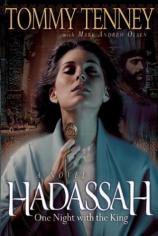Hadassah: One Night with the King
Review
Hadassah: One Night with the King
The Biblical tale of Esther, based on its Hebrew version (known as Megillah Esther, or The Volume of Esther), goes something like this: King Ahasuerus (now known as Xerxes) of Persia called for his wife, Queen Vashti, to appear at a banquet. When she refused (some theologians believe he meant to parade her naked before his guests), he banished her from the throne and decided to choose a new queen. While conducting a sort of beauty pageant of candidates, Ahasuerus was captivated by Esther, young woman whose Jewish identity was carefully concealed. He crowned his chosen new queen with diamonds.
But while Esther had hidden her identity, she had not forgotten it. When the uncle who raised her, Mordecai, learned of a plot to kill the king, she was able to save her husband's life and to bring her uncle to his attention. Later still, when the king's villainous minister Haman ordered destruction of all the Jews in the kingdom on the 13th day of the month of Adar by lots, or "purim," Mordecai urged his niece to plead with the king to save her people. Going before the king without a summons could mean death, so Esther's courage in doing so was great. She persuaded the king, using all her feminine wiles, to grant her any wish, and he did --- the Jews of Persia were saved and destroyed their enemies. The 14th and 15th days of Adar were then set aside as a feast, to be known forever after as "Purim."
Because of Esther's acceptance of her fate (hiding her faith and going willingly to the King's bed without benefit of marriage), her story has been denounced over the centuries by different Jewish and Christian commentators and clergy. Add to these criticisms the fact that the ten-chapter Book of Esther does not once mention God's name, and you have a tale that is not easy to tell as a Christian novel of redemption!
Tenney gets around some of the story's difficulties (perhaps why he enlisted fiction writer Mark Andrew Olsen as a "contributor?") by 1) limiting the "action" during Esther's first night with Xerxes to hours of deep conversation and 2) using the Orthodox Jewish trope of referring to God as "G-d" or "YHWH" so that readers will begin to believe that the absence of His name in The Book of Esther was pious and not premeditated.
Still, it's shocking at first to read Esther's calm, calculating reasons for allowing herself to be prepped for King Xerxes, and even more shocking to read of her growing desire for what would have been a lawless coupling: "I found that soon I began to desire the King in a wide variety of ways: to crave his presence, his words, his trust --- as well as that moment of our physical union." However, Tenney tries very hard to connect Esther's desire for the King with her growing desire for The King, or "G-d." He also, by framing her story with that of one of her descendants, a young contemporary Jewish bride-to-be, tries to connect Esther's elaborate knowledge and use of female adornments and beauty and sensitivity with the Judeo-Christian ideal of marriage.
Tenney's success in making these connections has its problems, in literary terms: the framing device is simply not strong enough or long enough for his purposes. His success in making these connections may have other problems, as well. But he does succeed in bringing Esther and her world vividly to life (at times HADASSAH: One Night with the King is reminiscent of Anita Diamant's THE RED TENT), and this can be connected to an important lesson that many theologians have made about The Book of Esther.
For Esther and other characters in the novel (including Mordecai and a young Jewish boy made into a eunuch), God's presence can seem farthest away when it is really closest. Jews celebrate the fact that Esther followed her path and used what she had to save her people. We may never know whether or not Esther followed that path because she believed God was guiding her, or not. Nevertheless, her story can instruct modern believers in having courage and struggling on despite the course of events. By re-imagining this rich, historic tale, Tenney has given readers a gift similar to that Esther gave Xerxes: a source of wonder and conversation.
Reviewed by Bethanne Kelly Patrick on January 1, 2004





